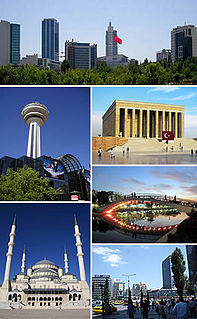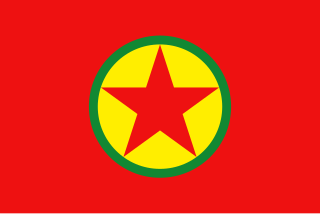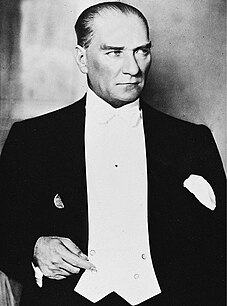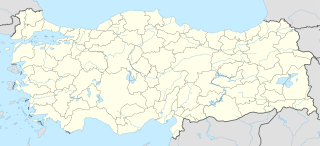
Ankara, historically known as Ancyra and Angora, is the capital of Turkey. With a population of 4,587,558 in the urban center (2014) and 5,150,072 in its province (2015), it is Turkey's second largest city after Istanbul, having outranked İzmir in the 20th century.

Cyprus, officially the Republic of Cyprus, is an island country in the Eastern Mediterranean and the third largest and third most populous island in the Mediterranean, located south of Turkey, west of Syria and Lebanon, northwest of Israel, north of Egypt, and southeast of Greece.

The Ottoman Empire, historically known in Western Europe as the Turkish Empire or simply Turkey, was a state that controlled much of Southeast Europe, Western Asia and North Africa between the 14th and early 20th centuries. It was founded at the end of the 13th century in northwestern Anatolia in the town of Söğüt by the Oghuz Turkish tribal leader Osman I. After 1354, the Ottomans crossed into Europe, and with the conquest of the Balkans, the Ottoman beylik was transformed into a transcontinental empire. The Ottomans ended the Byzantine Empire with the 1453 conquest of Constantinople by Mehmed the Conqueror.

Turkish, also referred to as Istanbul Turkish, is the most widely spoken of the Turkic languages, with around ten to fifteen million native speakers in Southeast Europe and sixty to sixty-five million native speakers in Western Asia. Outside Turkey, significant smaller groups of speakers exist in Germany, Bulgaria, North Macedonia, Northern Cyprus, Greece, the Caucasus, and other parts of Europe and Central Asia. Cyprus has requested that the European Union add Turkish as an official language, even though Turkey is not a member state.

The Kurdistan Workers' Party or PKK is a Kurdish far-left militant and political organization based in Turkey and Iraq. Since 1984 the PKK has been involved in an armed conflict with the Turkish state, with the initial aim of achieving an independent Kurdish state, later changing it to a demand for equal rights and Kurdish autonomy in Turkey.

Kurdistan or Greater Kurdistan is a roughly defined geo-cultural historical region wherein the Kurdish people form a prominent majority population and Kurdish culture, languages, and national identity have historically been based. Kurdistan roughly encompasses the northwestern Zagros and the eastern Taurus mountain ranges. The territory corresponds to Kurdish irredentist claims.

The Armenian Genocide, also known as the Armenian Holocaust, was the Ottoman government's systematic extermination of 1.5 million Armenians, mostly citizens within the Ottoman Empire. The starting date is conventionally held to be 24 April 1915, the day that Ottoman authorities rounded up, arrested, and deported from Constantinople to the region of Ankara, 235 to 270 Armenian intellectuals and community leaders, the majority of whom were eventually murdered. The genocide was carried out during and after World War I and implemented in two phases—the wholesale killing of the able-bodied male population through massacre and subjection of army conscripts to forced labour, followed by the deportation of women, children, the elderly, and the infirm on death marches leading to the Syrian Desert. Driven forward by military escorts, the deportees were deprived of food and water and subjected to periodic robbery, rape, and massacre. Other ethnic groups were similarly targeted for extermination in the Assyrian genocide and the Greek genocide, and their treatment is considered by some historians to be part of the same genocidal policy. Most Armenian diaspora communities around the world came into being as a direct result of the genocide.

Istanbul Atatürk Airport is an international airport in Istanbul.
Turkish Airlines is the national flag carrier airline of Turkey. As of 2018, it operates scheduled services to 304 destinations in Europe, Asia, Africa, and the Americas, making it the largest carrier in the world by number of passenger destinations. It serves more destinations non-stop from a single airport than any other airline in the world. Turkish Airlines flies to 122 countries, more than any other airline. With an operational fleet of 20 cargo aircraft, the airline's cargo division serves 82 destinations.

Northern Cyprus, officially the Turkish Republic of Northern Cyprus, is a de facto state that comprises the northeastern portion of the island of Cyprus. Recognised only by Turkey, Northern Cyprus is considered by the international community to be part of the Republic of Cyprus.

Recep Tayyip Erdoğan is a Turkish politician serving as the 12th and current President of Turkey since 2014. He previously served as Prime Minister from 2003 to 2014 and as Mayor of Istanbul from 1994 to 1998. He founded the Justice and Development Party (AKP) in 2001, leading it to general election victories in 2002, 2007 and 2011 before standing down upon his election as President in 2014. Coming from an Islamist political background and as a self-described conservative democrat, he has promoted socially conservative and liberal economic policies in his administration. Under his administration, Turkey has experienced democratic backsliding.

The Justice and Development Party, abbreviated officially AK Parti in Turkish, is a conservative and authoritarian political party in Turkey. Developed from the conservative tradition of Turkey's Ottoman past and its Islamic identity, the party is the largest in Turkey. Founded in 2001 by members of a number of existing conservative parties, the party has won pluralities in the six most recent legislative elections, those of 2002, 2007, 2011, June 2015, November 2015, and 2018. The party held a majority of seats for 13 years, but lost it in June 2015, only to regain it in the snap election of November 2015 but then lose it again in 2018. Its electoral success has been mirrored in the three local elections held since the party's establishment, coming first in 2004, 2009 and 2014 respectively. The current party leader is Recep Tayyip Erdoğan, the incumbent President of Turkey.

The Republican People's Party is a Kemalist and social-democratic political party in Turkey. It is the oldest political party in the country, and is currently the main opposition in the Grand National Assembly. The CHP describes itself as "a modern social democratic party, which is faithful to the founding principles and values of the Republic of Turkey". The party is cited as "the founding party of modern Turkey". Its logo consists of the Six Arrows, which represent the foundational principles of Kemalism: republicanism, nationalism, statism, populism, laicism, and reformism.

Turkey is divided into 81 provinces. Each province is divided into a number of different districts. Each provincial government is seated in the central district. The central district usually bears the name of the province. There are only three exceptions to this naming scheme:

The Turkish lira is the currency of Turkey and the self-declared Turkish Republic of Northern Cyprus.

The Süper Lig is a Turkish professional league for association football clubs. It is the top-flight of the Turkish football league system and is run by the Turkish Football Federation. Eighteen clubs compete annually, where a champion is decided and three clubs are promoted and relegated from, and to, the 1. Lig. The season runs from August to May, with each club playing 34 matches. Matches are played Friday through Monday.

Kemal Atatürk, commonly referred to as Mustafa Kemal Atatürk, was a Turkish field marshal (Mareşal), revolutionary statesman, author, and founder of the Republic of Turkey, serving as its first President from 1923 until his death in 1938. Ideologically a secularist and nationalist, his policies and theories became known as Kemalism.
Turkish people or the Turks, also known as Anatolian Turks, are a Turkic ethnic group and nation living mainly in Turkey and speaking Turkish, the most widely spoken Turkic language. They are the largest ethnic group in Turkey, as well as by far the largest ethnic group among the speakers of Turkic languages. Ethnic Turkish minorities exist in the former lands of the Ottoman Empire. In addition, a Turkish diaspora has been established with modern migration, particularly in Western Europe.

Istanbul, formerly known as Byzantium and Constantinople, is the most populous city in Turkey and the country's economic, cultural and historic center. Istanbul is a transcontinental city in Eurasia, straddling the Bosporus strait between the Sea of Marmara and the Black Sea. Its commercial and historical center lies on the European side and about a third of its population lives in suburbs on the Asian side of the Bosporus. With a total population of around 15 million residents in its metropolitan area, Istanbul is one of the world's most populous cities, ranking as the world's fourth largest city proper and the largest European city. The city is the administrative center of the Istanbul Metropolitan Municipality. Istanbul is viewed as a bridge between the East and West.



















